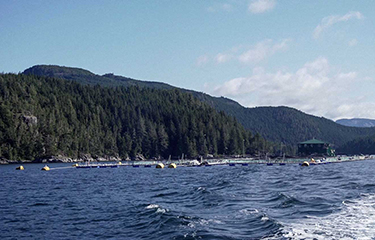Members of the First Nations Wild Salmon Alliance (FNWSA) have renewed calls to completely remove net-pen salmon farming in British Columbia, Canada, despite pushback from salmon farmers in the region.
A group of indigenous leaders from the FNWSA – which represents more than 120 First Nations – held a press conference in Ottawa, Canada, calling on the federal government to follow-through on its plans to transition away from net-pen salmon aquaculture in B.C. Canada’s Department of Fisheries and Oceans (DFO) first announced plans to begin salmon farm closures in December 2020, and since then has kicked off a net-pen transition process for the province.
That transition plan was initially expected to be released in early summer 2023, but was delayed in June 2023 and as of November has still not been released.
The First Nations group is continuing to push for the removal of net-pen salmon farms, claiming that it impacts their cultural, economic, and spiritual way of life through impacts on wild salmon, the CBC reported.
“This is a very clear opportunity for the federal government to take meaningful actions for reconciliation with First Nations literally across the province of British Columbia and in doing so enacting a safeguard for food security,” FNWSA Chair Bob Chamberlin said.
The FNWSA is not the only First Nations group in the region oriented around salmon farming. A group of 17 first nations in B.C. formed the Coalition of First Nations for Finfish Stewardship in early 2023 advocating for the continuation of salmon farming in B.C.
The B.C. Salmon Farmers Association, responding top the FNWSA’s news conference and calls to ban salmon farming, also pointed out that all salmon farms operating in B.C. do so through agreements, negotiations, or established partnerships with First Nations groups, in whose territories the salmon farms operate.
The association said there is currently no mandate to ...
Photo courtesy of the B.C. Salmon Farmers Association








